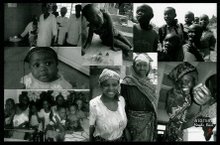

After showering on Tuesday morning (the 20th), I realized that the strange burning smell I had been noticing was coming from my hair – no more ironing… beauty is pain! Alison and I busied ourselves around the apartment making calls to arrange and reschedule meetings and running back and forth from Kivulini to wrap up some loose ends. We set off to town to re-activate Alison’s cell phone and grab a quick lunch before doing a huge grocery shop in town. We were happy to see that the mamas’ yogurt is being sold at Lavena Supermarket (one of the biggest grocery stores in town) for 2000 Tsh/litre… very exciting in terms of sales and distribution! After dropping the food off at home, we went back into the city so that Alison could meet Manuela in order to book their Christmastime safari together. I spent an hour reading research papers at the pizzeria over a milky chai… reminiscent of endless days studying in the library at UWO (slightly different due to the tropical climate here). I met the girls at Swahili class & afterwards enjoyed our customary Tuesday evening of swimming and dinner at Claire’s.
On Wednesday morning (the 21st) I prepared an English lesson for the mamas and typed up a copy of Kivulini’s lease to give to Ruben so that he may use it to negotiate with the landlord (I discovered that she is trying to charge us WAY more than Kivulini pays for essentially the same space… unsurprising but still unfair). Alison called Mr. Ngowi, Mwanza’s TASAF (the Tanzania Social Action Fund) coordinator, and we rushed out to meet him after hearing that he was in the office. We first picked up Mama Paskwalina from Mabatini and then drove into the city. Mr. Ngowi was very happy to see us and was glad to receive the group’s TASAF application from Mama Paskwalina (the street leader finally relented and helped them to organize the community meeting required for its completion). Though we had been expected a few weeks earlier, we were happy to hear that we were not too late to be considered for the grant. We were blown away when Mr. Ngowi showed us the extremely detailed three-page budget that he had prepared for us, along with a month-by-month action plan for the project’s implementation, and even a sketch of a ‘banda’ (cow shed) that they intend to construct. The budget missed nothing – it allows for the purchase of four pregnant cows and one bull, all the costs and purchases associated with building a shed, a year’s supply of grass for the cows, a bicycle, medication for the animals, training (the most important component, in my mind – allowing the mamas to choose what they want to be trained in), etc… totalling almost 9 million Tsh (about 7500 CDN) Mr. Ngowi assured us that the application has a very good chance of going through and sent us on our way with further instructions of tasks to be completed. We drove up to Mabatini with an agricultural surveyor who was to assess a potential piece of land where the banda may be built. Unfortunately, he found the space to be too small and too close to family homes. Nevertheless, we were very excited to hear of the potential for support from the Tanzanian government – a very important step towards sustainability.
We returned home and split up – Alison to Nyakato with Omari (from Kivulini) and Mama Paskwalina to meet with an architect to look at designs for a new kitchen, and me to the internet café to send a very exciting update email home and to check for a quote from Tukay for the Nyamongoro site. We had planned to meet our friend Tini in town at 3pm to travel back to Mabatini with representatives from the German Embassy in Dar es Salaam – another opportunity to apply for a grant to support the project’s growth – but found out that the Germans’ plane had been delayed. We ran some errands in town to kill time before meeting with Tini at 5.45pm to show off Tukwamuane’s project to the embassy representatives. They stayed for only a short visit, as they were scheduled to see a couple other projects in Mwanza, but they were very positive about the project and encouraged us to apply for support from them. After a very tiring and productive day, Alison and I went to Kivulini Kitchen (a restaurant in Isamilo) to say goodbye & happy birthday to Ray (Claire’s boss at Catholic Relief Services) as he departs Mwanza for the USA.
We left home on Thursday morning (the 22nd), met Mama Paskwalina at the bottom of the Mabatini hill and grabbed a dala-dala to Nyakato where we walked to the Roman Catholic parish where Nico (Isaac’s friend) is the pastor. Before we left, we saw the AIDS Outreach Centre affiliated with the parish and met some of the staff who work there – they offer mostly counselling and educational support for the community. Together, we left to Mahina to attend their weekly community meeting and pick up the CD4 counts of the members who had agreed to help us with project research. We waited for quite some time for the meeting to begin before they informed us that they didn’t have the numbers ready. I realize that I have become cynical when it comes to promises of productivity in Tanzania, so I wasn’t surprised that nothing had been prepared. Instead, we provided them with a template for the data and gave them our phone numbers to call for pick-up when the information is ready. After meeting in Mahina, Alison and I walked through Nyakato to Heifer International for our rescheduled meeting with Dr. Sokombi. Our discussion was very interesting, allowing us to come to a better understanding of both the challenges presented to NGOs by the changing face of HIV/AIDS and the current state of the dairy industry in Mwanza – a bit strange to focus on these two issues side-by-side. From Nyakato, we took a dala-dala back to Mabatini for chai and yogurt purchasing and then returned home. In the afternoon, we went into town (no chance to get online due to power cuts) and walked to NIMR to meet with Mr. Temu, the chairman of the microbiology department. Unfortunately, what we thought would be a useful discussion about the production and access of probiotic milk actually was just a chance for him to reschedule the meeting to the following week. We trudged back to town under the blazing midday sun for Swahili and then drove to Tunza for a very relaxing yoga class – desperately necessary in the middle of an extremely hectic week! Alison and I returned home after yoga for dinner and a movie… we were exhausted both mentally and physically.

Yunisi, looking beautiful in her kitenge.
Playing a "toss-the-hat" game with Ross and some local children.
We spent Sunday morning (the 25th) reading around the pool, returning back to our room to prep the lunch while the boys headed out to make a new fire at the campsite. When we hadn’t heard from them two hours later, Tini, Claire and I decided to take action ourselves and built a fire on the doorstep of our room. This was probably not ‘safi’ (cool) with the hotel staff, but we produced a delicious pasta and sauce and were very proud of ourselves. Hours later, we heard a few shotguns fire and the boys rolled back to the room, covered from head to toe in mud and carrying their trophy guinea fowl. They had found themselves stuck in the mud after venturing “off-road” and had spent hours getting going again. We enjoyed our meal and the fresh kill from the plains before driving back to Mwanza in the middle of another massive thunderstorm.
 Claire and Tini, working hard to prepare our meal on an open fire, steps away from our room.
Claire and Tini, working hard to prepare our meal on an open fire, steps away from our room.With three weeks left in Mwanza and so much on the go pertaining to the project, I feel as though these weeks will continue to be frenzied with activity as we wrap up our efforts. It’s a great feeling to be ending our internship on such a positive note, with so much potential for the future growth of the project.






1 comment:
MICATZ, a non-profit organization based in Tanzania, places volunteers from across the world willing to assist in various welfare projects in schools, hospitals, orphanages, monasteries, community/government organizations etc. with an aim to educate and help influence the life of the deprived people throughout Asia, Africa and Latin America.
Post a Comment